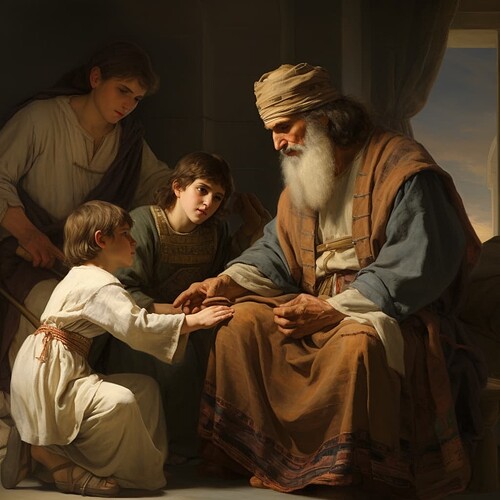![]() January 29: Genesis 48-50: The Legacy of Jacob and Joseph
January 29: Genesis 48-50: The Legacy of Jacob and Joseph
Exploring the Enduring Faith and Providence
![]() Introduction
Introduction
As we explore Genesis 48-50 on January 29th, we witness the culmination of Jacob’s life and the remarkable journey of Joseph. These chapters not only mark the end of the patriarchal narratives but also set the stage for the future of the Israelites in Egypt and beyond.
![]() Genesis 48: Jacob’s Blessing to Ephraim and Manasseh
Genesis 48: Jacob’s Blessing to Ephraim and Manasseh
In Genesis 48, Jacob, nearing the end of his life, blesses Joseph’s sons, Ephraim and Manasseh. In a surprising turn, he crosses his arms and places his right hand on the younger Ephraim, signifying a greater blessing. This act underscores the theme of God’s unexpected choices in His plan.
![]() Key Verse: “But his father refused and said, ‘I know, my son, I know. He too will become a people, and he too will become great. Nevertheless, his younger brother will be greater than he, and his descendants will become a group of nations.’” — Genesis 48:19
Key Verse: “But his father refused and said, ‘I know, my son, I know. He too will become a people, and he too will become great. Nevertheless, his younger brother will be greater than he, and his descendants will become a group of nations.’” — Genesis 48:19
![]() Genesis 49: Jacob’s Prophetic Blessings
Genesis 49: Jacob’s Prophetic Blessings
Jacob’s blessings in Genesis 49 reveal the future of the twelve tribes of Israel. Each blessing is tailored to the character and future of his sons, painting a prophetic picture of their descendants.
![]() Key Verse: “Jacob called for his sons and said: ‘Gather around so I can tell you what will happen to you in days to come.’” — Genesis 49:1
Key Verse: “Jacob called for his sons and said: ‘Gather around so I can tell you what will happen to you in days to come.’” — Genesis 49:1
![]() Genesis 50: Joseph’s Forgiveness and Jacob’s Death
Genesis 50: Joseph’s Forgiveness and Jacob’s Death
Genesis 50 narrates the death of Jacob and the poignant moment where Joseph reassures his brothers of his forgiveness. It beautifully illustrates Joseph’s unwavering faith and his understanding of God’s sovereign plan amidst suffering.
![]() Key Verse: “You intended to harm me, but God intended it for good to accomplish what is now being done, the saving of many lives.” — Genesis 50:20
Key Verse: “You intended to harm me, but God intended it for good to accomplish what is now being done, the saving of many lives.” — Genesis 50:20
![]() Key Themes and Reflections:
Key Themes and Reflections:
The Sovereignty of God’s Plan: These chapters highlight God’s sovereignty, where human plans are often subverted to fulfill His greater purpose.
The Power of Forgiveness: Joseph’s forgiveness towards his brothers is a profound example of grace, reflecting God’s forgiveness towards us.
Legacy and Prophetic Vision: The blessings and prophecies reveal a deep sense of legacy and a vision for the future, emphasizing that our actions have lasting implications.
![]() Today’s Application:
Today’s Application:
Contemplate the role of forgiveness in your life. Reflect on how understanding God’s sovereignty can bring peace amidst trials and shape your legacy.
![]() Hidden Gem:
Hidden Gem:
Did you know? The “blessing of Joseph” in Genesis 49:
22-26 is considered one of the most comprehensive blessings in the Bible, encompassing prosperity, strength, and favor from God.
![]() Reflective Q&A:
Reflective Q&A:
![]() Genesis 48-50: The Journey of Faith
Genesis 48-50: The Journey of Faith
![]() Understanding God’s Sovereignty: How do the events in these chapters enhance our understanding of God’s sovereignty and His way of working through human history?
Understanding God’s Sovereignty: How do the events in these chapters enhance our understanding of God’s sovereignty and His way of working through human history?
A: These chapters demonstrate that God’s plans often defy human expectations and reasoning. Jacob’s blessing of the younger Ephraim and Joseph’s rise to power despite his initial hardships reflect that God’s ways are higher than ours, guiding history towards His divine purposes.
![]() The Significance of Forgiveness: What can we learn from Joseph’s response to his brothers’ betrayal and how can it inspire us in dealing with personal grievances?
The Significance of Forgiveness: What can we learn from Joseph’s response to his brothers’ betrayal and how can it inspire us in dealing with personal grievances?
A: Joseph’s forgiveness is a powerful testament to his faith in God’s plan. It teaches us that holding onto grievances hinders God’s work in our lives, whereas forgiveness can lead to healing and restoration. It challenges us to view our personal betrayals through the lens of God’s overarching plan.
![]() Genesis 50: Joseph’s Perspective on Providence
Genesis 50: Joseph’s Perspective on Providence
![]() Interpreting Life’s Challenges: How does Joseph’s perspective on his life’s challenges inspire us to view our own struggles?
Interpreting Life’s Challenges: How does Joseph’s perspective on his life’s challenges inspire us to view our own struggles?
A: Joseph’s understanding that God turned his brothers’ harm into good is a profound reminder that our struggles can be part of God’s redemptive plan. It encourages us to trust in God’s providence, believing that He can bring good out of our challenges and use them for a greater purpose.
![]() Join the Discussion:
Join the Discussion:
What insights have you gained from the story of Jacob and Joseph about faith, forgiveness, and God’s providential plan? Share your reflections in the comments below!
#Genesis48 #Genesis49 #Genesis50 #Joseph #Jacob #Forgiveness #Providence #BibleStudy #SpiritualJourney
![]() See You Tomorrow in Exodus: Embark on a new journey with us as we dive into the Book of Exodus and uncover the story of liberation and covenant.
See You Tomorrow in Exodus: Embark on a new journey with us as we dive into the Book of Exodus and uncover the story of liberation and covenant.
